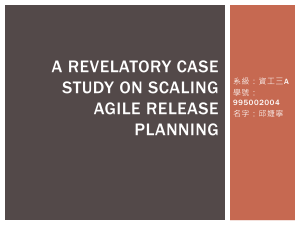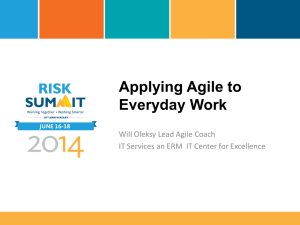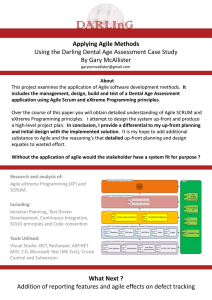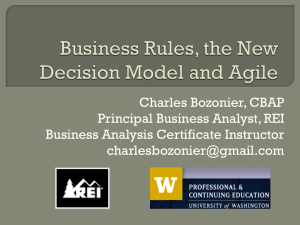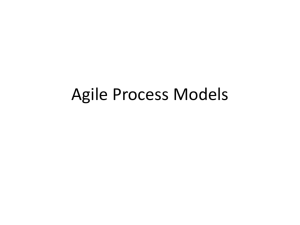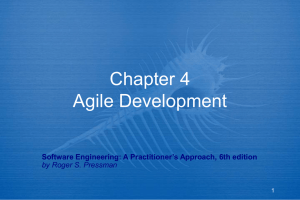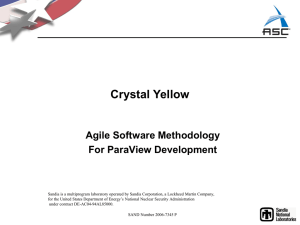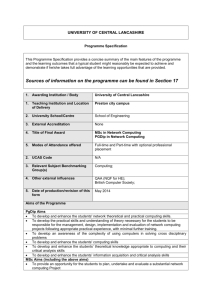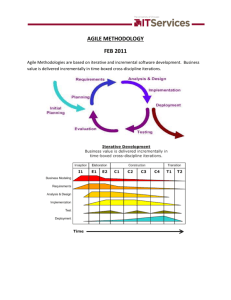MSc Agile Software Projects (Jan 2013)
advertisement
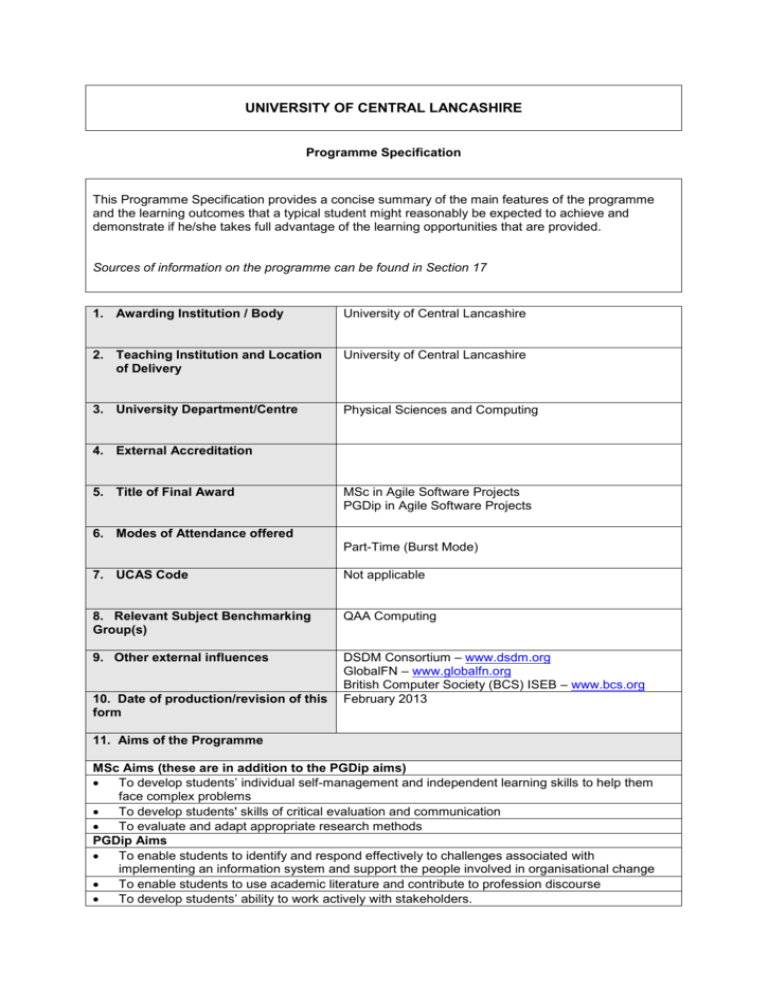
UNIVERSITY OF CENTRAL LANCASHIRE Programme Specification This Programme Specification provides a concise summary of the main features of the programme and the learning outcomes that a typical student might reasonably be expected to achieve and demonstrate if he/she takes full advantage of the learning opportunities that are provided. Sources of information on the programme can be found in Section 17 1. Awarding Institution / Body University of Central Lancashire 2. Teaching Institution and Location of Delivery University of Central Lancashire 3. University Department/Centre Physical Sciences and Computing 4. External Accreditation 5. Title of Final Award MSc in Agile Software Projects PGDip in Agile Software Projects 6. Modes of Attendance offered Part-Time (Burst Mode) 7. UCAS Code Not applicable 8. Relevant Subject Benchmarking Group(s) QAA Computing 9. Other external influences DSDM Consortium – www.dsdm.org GlobalFN – www.globalfn.org British Computer Society (BCS) ISEB – www.bcs.org February 2013 10. Date of production/revision of this form 11. Aims of the Programme MSc Aims (these are in addition to the PGDip aims) To develop students’ individual self-management and independent learning skills to help them face complex problems To develop students' skills of critical evaluation and communication To evaluate and adapt appropriate research methods PGDip Aims To enable students to identify and respond effectively to challenges associated with implementing an information system and support the people involved in organisational change To enable students to use academic literature and contribute to profession discourse To develop students’ ability to work actively with stakeholders. To enable the students to critically evaluate and contribute to an agile project To encourage and enable the students to become reflective practitioners 12. Learning Outcomes, Teaching, Learning and Assessment Methods A. Knowledge and Understanding The successful student will be able to: A1. Critically evaluate policies and approaches to Agile methods and strategy A2 Apply and evaluate principles, practices and tools needed for an Agile approach A3. Interpret relevant literature and evaluate trends relating to Agile methods and strategy Teaching and Learning Methods Lectures, directed reading, tutorial exercises, visiting speakers, case studies, supervised and unsupervised practical work. Project and literature-based research. Assessment methods Assessment methods are specified in each module syllabus. All learning outcomes in a module are assessed with the mode of assessment specified for each outcome of the assignment. Assessment methods include written reports, portfolios, practical assessment, presentations and examinations. B. Subject-specific skills The successful student will be able to: B1. Identify and develop strategies for working with stakeholders of IT projects, and elicit and specify system requirements B2. Facilitate and scribe joint development workshops. B3. Demonstrate a professional approach to ethical and legal issues and understand the implications of their actions B4. Apply skills, techniques and knowledge to plan, perform and evaluate a substantial project (MSc only) Teaching and Learning Methods Lectures, tutorial exercises, role-play, visiting speakers, case studies, group workshops, video case studies, directed reading Assessment methods Assessment methods are specified in each module syllabus. All learning outcomes in a module are assessed with the mode of assessment specified for each outcome of the assignment. Assessment methods include written reports, portfolios, practical assessment, presentations and examinations. C. Thinking Skills The successful student will be able to: C1. Solve technical and human problems relating to the development and use of systems. C2. Locate, synthesise and evaluate information from a variety of sources. C3. Apply knowledge that was created for use in one situation to a new situation C4. Analyse complex systems and concepts, communicating the outcome effectively Teaching and Learning Methods Lectures, tutorial exercises, role-play, visiting speakers, case studies, group workshops, video case studies, directed reading Assessment methods Assessment methods include written reports, portfolios, practical assessment, presentations and examinations. D. Other skills relevant to employability and personal development The successful student will be able to: D1. Sustain current awareness through review of a range of source material D2 Reflect critically on professional experience, devising and evaluating new approaches D3 Develop individual self-management and independent learning skills D4 Work as part of a team, identifying issues and devising responses Teaching and Learning Methods Lectures, tutorial exercises, role-play, visiting speakers, case studies, group workshops, video case studies, directed reading Assessment methods Assessment methods include written reports, portfolios, practical assessment, presentations and examinations. 13. Programme Structures* Level Module Code Module Title 14. Awards and Credits* Credit rating Masters Degree in Agile Software Projects Level 7 CO4804 Masters Project 60 Requires 180 credits at Level 7 The project will include substantial work with people Post-Graduate Diploma in Agile Software Projects Level 7 CO4603 CO4608 CO4754 CO4820 CO4830 Workshop Facilitation Agile Systems Development User-Centred Systems Design & Evaluation Critical Analysis IT Project Management 20 20 20 20 20 One module from the following list of options (or an alternative agreed with the course leader): CO4403 CO4758 CO4757 CO4753 CO4817 OO Software Development Advanced Topics in Information Systems Advanced Topics in Databases Design Away from the Desktop Student Initiated Module 20 20 20 20 20 Requires 120 credits at Level 7. This must include CO4603 Workshop Facilitation CO4608 Agile Systems Development CO4754 User Centred Systems Design & Evaluation CO4820 Critical Analysis CO4830 IT Project Management A student who has previously passed a module whose content and level is similar to one of those listed, may be offered another level 7 module from the School’s modules, as an alternative. Post-Graduate Certificate in Computing Requires 60 credits at Level 7 15. Personal Development Planning Professional skills cannot be developed through dedicated course modules, but are fostered through the adaptation of teaching methods such as seminars, project work and oral and written coursework to make these qualities an explicit element of the content and context of all work. This will be reflected in the criteria by which you are assessed. Technical competence alone is not enough for the good computing professional and so is not sufficient for the award of any Masters within the School of Computing, Engineering & Physical Sciences. The Programme aims identify the need to develop interpersonal skills and generic transferable skills as well as subject-specific knowledge, understanding and skills. The course team believe that this combination is needed to ensure the employability of the graduate. The following transferable skills are developed: critical evaluation presentation skills report-writing skills investigative (information finding) skills problem solving independent learning team work time-management. The design of the course has been directed to the development of these practitioner skills alongside technical competence. The skills will be developed and assessed throughout the programme as a whole. The process begins from the first day of the programme with an induction scheme aimed at developing reflective learning skills and is continued seamlessly through the delivery of the course modules. The personal tutor, allocated at enrolment, helps students to determine their personal development plans and use will be made of the Skills Learning Resource available from the Learning Development Unit (LDU) www.uclan.ac.uk/skills . There are opportunities throughout the course for students to reflect on their learning and revise their personal development plans. Students will have a minimum of 2 tutorials with their personal tutor to discuss their personal development 16. Admissions criteria Programme Specifications include minimum entry requirements, including academic qualifications, together with appropriate experience and skills required for entry to study. These criteria may be expressed as a range rather than a specific grade. Amendments to entry requirements may have been made after these documents were published and you should consult the University’s website for the most up to date information. Students will be informed of their personal minimum entry criteria in their offer letter. In order to gain admission to the course you should have one of the following: Honours degree of 2.ii or above Degree and substantial relevant industrial experience BCS post-graduate diploma plus PGD project Qualifications deemed by the University to be equivalent to the above. Students will also be expected to be employed within the software development industry. If students do not have this experience, they would be interviewed to assess their suitability for the course. Students will be expected to display communication skills appropriate to an Honours graduate. In particular, students whose first language is not English will be required to demonstrate competence in the language. The normal minimum standard required is IELTS 7.0 or equivalent. 17. Key sources of information about the programme www.uclan.ac.uk/agilemsc fact sheet postgraduate prospectus 18. Curriculum Skills Map Please tick in the relevant boxes where individual Programme Learning Outcomes are being assessed Programme Learning Outcomes Core (C), Compulsory Module (COMP) or Knowledge and Level Code Module Title Option (O) understanding Subject-specific Skills Thinking Skills A1 PGDip MSc CO4804 Masters Project CO4603 Workshop Facilitation CO4608 Agile Systems Development User-Centred System Design & CO4574 Evaluation CO4830 IT Project Management CO4820 Critical Analysis CO4403 OO Software Development CO4758 Adv Topics in IS CO4757 Adv Topics in Database Systems CO4817 Student Initiated Module Note: C Comp Comp Comp Comp Comp Option Option Option Option A2 A3 B1 B2 B3 B4 C1 C2 C3 C4 D1 D2 D3 Other skills relevant to employability and personal development Mapping to other external frameworks, e.g. professional/statutory bodies, will be included within Student Course Handbooks D4
